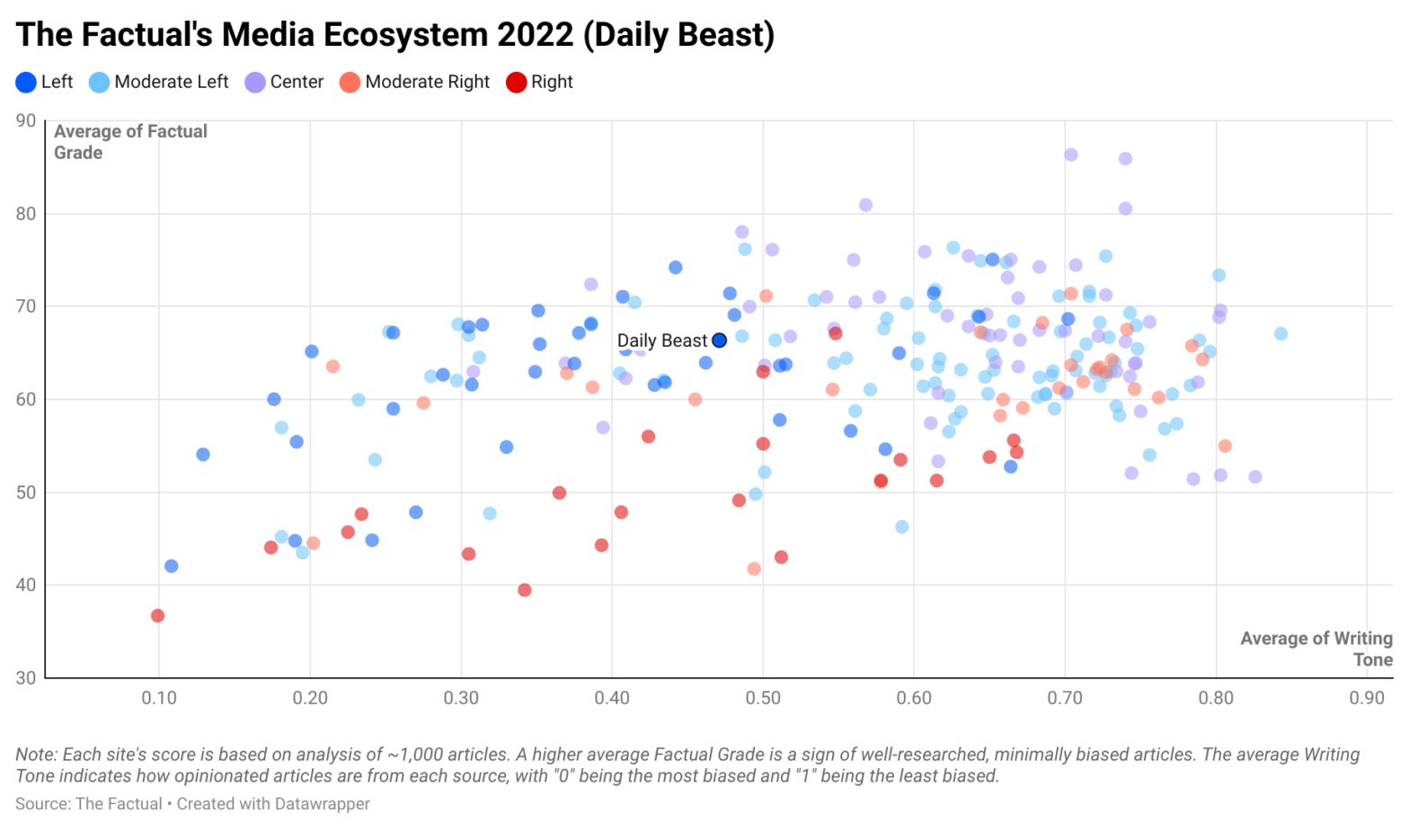The Daily Beast is an American news website focused on delivering independent journalism across politics, pop culture, and power. Founded in 2008, the Daily Beast currently brings in a daily readership of over 1 million to their website, but it has been notably characterized as a “high-end tabloid” by their former editor-in-chief. So, how biased and reliable is the Daily Beast’s content?
How Does The Factual Rate News Sources?
The Factual analyzes more than 10,000 news stories every day to help readers find the most informative, least-biased articles. Our news-rating algorithm scores each article along four metrics: (1) cited sources and quotes, (2) publication history, (3) writing tone, and (4) author expertise. These scores combine in a weighted average we call a Factual Grade, which ranges from 0–100%. (See our How It Works page to learn more about our algorithm.)
For this study, we analyzed ~1,000 articles each from 240 news sources. The average Factual Grade for the entire dataset was 62.5%. Based on these averages, we can compare the performance of news sites across the media ecosystem.
How Factual Is the Daily Beast?
The Daily Beast scored an average Factual Grade of 66.4%, placing in the 64th percentile of our dataset. Several factors explain these above-average scores. For instance, the site tends to follow strong sourcing of information, using numerous, reliable external sources. Additionally, the site has dedicated journalists who cover specific topics, leading to high scores for author expertise. However, the tabloid style of the site also leads to sensationalized titles and opinionated text, which drags scores downwards.
Like any news source, scores for articles from the Daily Beast varied widely. For example, some scored above 80%, while others scored below 50%.
Please check your email for instructions to ensure that the newsletter arrives in your inbox tomorrow.
How Opinionated Is the Daily Beast?
The Factual measures how opinionated an article is using a sophisticated natural language processing algorithm, producing a score we call the Writing Tone. For this metric, the algorithm looks for signs of subjective commentary (e.g., first-person pronouns, unnecessary adverbs), as well as the emotional nature of selected words, and sees how prevalent they are for a given length of text. Text which is less opinionated gets higher ratings, with “0” being the most opinionated and “1” being the most neutral.
The Daily Beast scored an average Writing Tone of 0.47, placing it in the 27th percentile in our dataset. This suggests that articles from the site often have a moderately opinionated tone. This can be seen in article headlines such as “Panicked Trumpworld Looks for Its Jan. 6 Patsy” and “Senate Republicans Hem, Haw, and Even Back Gay Marriage Bill.”
What Is the Daily Beast’s Political Bias?
The Factual classifies media organizations by political bias as either Left, Moderate Left, Center, Moderate Right, or Right. This classification comes from third-party assessments from media bias organizations such as AllSides and Media Bias/Fact Check. Based on this data, The Factual assigns the Daily Beast a Left bias.
AllSides assigns the Daily Beast a “Left” bias, based on an editorial review, community feedback, blind surveys, and independent research. In a survey of 3,614 users across the political spectrum, AllSides found most people agreed that the news source had a “Left” bias. Previously, AllSides assessed the Daily Beast as having a “Center” bias, but this has since shifted as of January 2018. The site claims to be “independent,” yet AllSides indicates their reporting has become increasingly partisan since the 2016 presidential election. An AllSides analysis discovered that the Daily Beast's articles, headlines, and graphics all exhibit substantial left-leaning bias. This was the first time AllSides has seen media bias scores significantly jump in such a short period of time.
Similarly, Media Bias/Fact Check (MBFC) rates the Daily Beast as having a “Left” bias based on editorial positions and story selections that tend to favor the left. They note that the Daily Beast utilizes emotionally loaded wording and sensationalized headlines like “No, Rudy: Trump Isn't Othello. He’s lago.,” and “Imagine a Trump Who Could Constrain Himself and Just Talk About the Economy.” MBFC gives the website a “Mixed” score for factual reporting, based on several failed fact-checks.
Who Owns the Daily Beast?
The Daily Beast was founded in 2008 by magazine editor, columnist, and talk-show host Tina Brown, who served as editor-in-chief for magazines such as Tatler, Vanity Fair, The New Yorker and Talk. Media and internet conglomerate InterActiveCorp owns the Daily Beast as well as other world-famous brands, including HomeAdvisor, Vimeo, About.com, Dictionary.com, and more. In 2008, Brown teamed up with American media mogul Barry Diller of IAC to launch the Daily Beast.
Please check your email for instructions to ensure that the newsletter arrives in your inbox tomorrow.
Why Does It Matter?
News articles are bound to have a bias because all authors have some frame of reference within which they describe a story. Political bias ratings are helpful in understanding this framing. However, it can be more beneficial to know how factual an article is based on quantifiable metrics that can be seen across the media ecosystem, from cited evidence to author expertise, to the writing tone. This is what The Factual ascertains.
Reading several, highly rated articles from across the political spectrum helps counter the bias of any news source or story. To have the day’s most factual news stories delivered to your inbox every morning, subscribe to our daily newsletter.
Article updated on September 15, 2022 to reflect new data.

